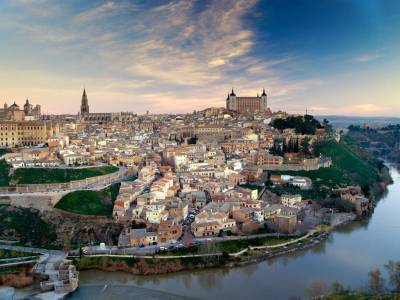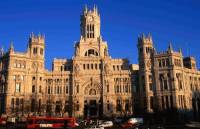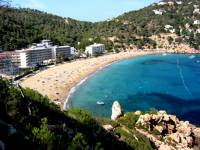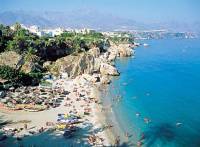Spain being on the
border of the European and African continents, Christian and Islamic worlds,
combining the history and culture of some people, having a developed tourist
infrastructure, Spain is one of the most attractive places for recreation and
tourism.
Spain
- a country of flamenco and bullfighting, a country of hot sun and gentle sea,
a country of beautiful mountain scenery and the amazing beauty of national
parks. The country's
famous paella and wonderful Spanish wines.
Spain
- the birthplace of Miguel de Cervantes, Antonio Gaudi, Montserrat Caballe,
Salvador Dali, Pablo Picasso, and many other famous Spaniards, who have
excelled in all kinds of human activity, ranging from politics and ending with
the science, art and sports.
Spain
receives annually about sixty millions of travelers.
Photos Spain
Spain
Overview
Spain
is located in southwestern Europe, occupying almost the entire Iberian
Peninsula. Official name -
Kingdom of Spain. Spain
by the Mediterranean Sea, the Bay of Biscay and the Atlantic Ocean. Spain
is bordered on the east and north-east France and Andorra, and Portugal in the
west, south to the British colony of Gibraltar and North Africa to Morocco.
The geography of the country
The relief of Spain is
very diverse. 90%
of the country is mountainous and plateau with more than 65% of Spain is
situated above 500 meters above sea level, including more than 25% - higher
than 1,000 meters.
Photo Castle Navarre Spain
The
highest point in Spain is the peak of the Teide (3718 m), which is located on
the island of Tenerife (Canary Islands).
The
main mountain ranges of the country are: the Cantabrian Mountains, which
stretch along the Bay of Biscay, Pyrenees mountains in the east, with the
highest point 3404 meters above sea level (peak Aneto) Catalan mountains in the
north-east of the country; Iberian mountains, which occupy most of Spain and Andalusian mountains in the south.
In
its natural features Spain is divided into several regions. Galicia
and the Cantabrian Mountains differ humid oceanic climate, deep rivers, lush
vegetation.
Pyrenees
different altitudinal zones greatest landscapes, dominated by coniferous
forests.
Spain
For
the central part of Spain is characterized by arid plateau with sparse
vegetation, consisting mainly of shrubs and various herbs. Andalucian
plain different hot, almost African climate.
Predominates
in the Canary Islands volcanic terrain, oceanic climate, and North African
vegetation. And
finally, the Balearic Islands boast a hot subtropical and Mediterranean forests.
Spain
can not boast of large lakes and deep rivers. Most
of the rivers of the country become very shallow in the summer, and some of
them dry up altogether. That
is why Spain has never been developed in river navigation.
The
largest rivers of the Atlantic Ocean basin: the Guadalquivir, Tagus, Duero. The Mediterranean: the
Ebro, Segur, Júcar.
The political system of the
country
In
its political structure Spain is a parliamentary republic. The current
Constitution was adopted in 1978. Under
the Constitution, in Spain there is a separation of legislative, executive and
judiciary. King
is the head of state and supreme commander of the armed forces of Spain.
Photo of El Escorial Spain
Spain's
Parliament consists of two chambers: the Congress of Deputies and the Senate. Members of
Parliament are elected every four years nationally. The
branch of the executive branch in Spain formed the Prime Minister, nominated
by, in turn elected by Parliament.
Administratively
Spain is divided into 17 autonomous communities and two autonomous cities of
Melilla and Vanity, which are on the African coast. The
autonomous communities have wide legislative and executive rights to their own
parliaments and regional governments. The rights of autonomy are
not universal. They
were developed for each area separately in negotiations over the centuries the
central government of Spain and the regions.
Customs regulations
To
enter Spain, you must have a Schengen visa in the passport.
Upon
entry into Spain are allowed to carry duty free personal belongings, camcorder
or camera, radio, tape recorder, if it is clear that this is not new items. Permitted
to bring personal ornaments and personal sports equipment.
Allowed
to import 200 cigarettes or 50 cigars or 250 grams tube of tobacco, one bottle
of wine plus one bottle of any alcoholic beverage.





